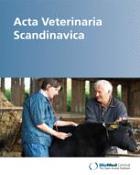|
Literature / Source Database:
Acta Veterinaria Scandinavica
Description
It is the official journal of the Veterinary Associations of the Nordic Countries, and was founded in 1959 as a traditional print journal, but has taken the novel step of moving to an open access publishing model.
| Title (short) |
Acta Vet. Scand. |
| Title (abbrev) |
AVS |
| CODEN |
AVSCA7 |
| Languages |
English |
| First year |
1959 |
| Impact factor |
1.2 |
| Editor |
Mats Forsberg, |
|
|

|
Status
active
Subject

Source type
Journal
Publisher
E ISSN
0044-605X
First volume
42
Last volume
50+
Homepage
| Resources |
|
Availability |
|
|
|
|
|
| Text PDF |
 |
free access |
 |
| Text Html |
 |
for subscriber |
 |
| References |
 |
not available |
 |
| Abstracts |
 |
|
|
| TOC |
 |
|
|
|
|
|
|

Description
Acta Veterinaria Scandinavica is an open access, peer-reviewed online journal that encompasses all aspects of veterinary research and medicine of domestic and wild animals. It is the official journal of the Veterinary Associations of the Nordic Countries, and was founded in 1959 as a traditional print journal, but has taken the novel step of moving to an open access publishing model. Content overview Acta Veterinaria Scandinavica considers the following types of articles: - Research: reports of data from original research.
- Reviews: comprehensive, authoritative, descriptions of any subject within the journal's scope. Reviews can cover any topical themes such as basic science and clinical reviews, ethics, pro/con debates, equipment reviews and thematic series to highlight specific topics in the field.
- Case reports: reports of clinical cases that can be educational, describe a diagnostic or therapeutic dilemma, suggest an association, or present an important adverse reaction.
- Case studies: case study articles that include a rigorous assessment of the processes and impact of the intervention as well as recommendations for future interventions will be considered favourably.
- Methodology articles: present a new experimental method, test or procedure. The method described may either be completely new, or may offer a better version of an existing method.
- Brief communications: brief reports of data from original research, usually about 1500 words.
|